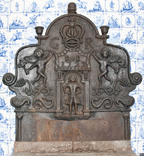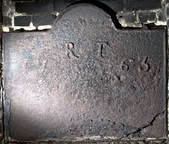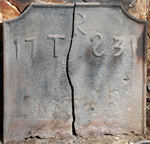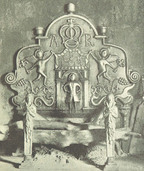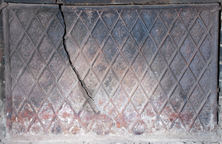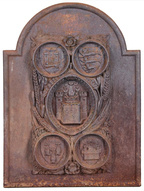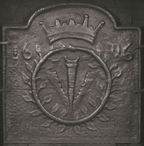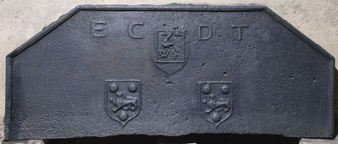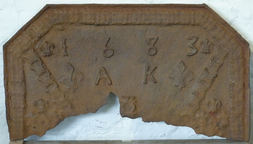-
1209
Description: Individually designed quasi-arched rectangular shape; astragal edging; central portico with framed doorway and sloping roof, in which stands a male figure dressed in contemporary style; above the roof, the date, and above that, the initials R R separated by a flower head, this inscription enclosed within a five-sided ribbon compartment held at the top corners by a pair of mirrored dancing cherubs each of which holds in their outer hand a wand surmounted by a fleur-de-lys; below them are mirrored vine designs terminating in a grape bunch, and below each of them a mirrored swirled snake, its head reversed; towards the outer side of these snakes are a pair of mirrored birds within a curved cartouche of slightly raised relief that is associated with a swirl on each side of the fireback that terminates the astragal edging on each side and which ascends via a step surmounted by a miniature urn on each shoulder of the back to the top which is surmounted by an acorn shape; above the ribbons held by the cherubs, is a stylised crown between the initials GR; the above features are limited by a horizontal astragal, though the portico descends below it, and which is supported at each end by a simple Doric column enclosing the bottom panel which is otherwise plain.
Notes: The initials GR are of Georgius Rex - King George I. Finely cast but of naïve design, another fireback of the same design but with different inscriptions and dated 1714 is at Low Graythwaite in Hawkshead parish, which was home to the Rawlinson family who, in 1711, built the first blast furnace in what was then the northern part of Lancashire.
Inscription: G R / R R / 1723
- Decoration tags:
- rectangular with round arch (shape)
- astragal (edging)
- whole carved pattern
- individual letters
- individual numbers
- heraldic
- mythological
- text
- humans
- plants
Manufactured: in 1723 possibly at Backbarrow Furnace in the Furness area of England.
Current location: Blackwell House, Bowness-on-Windermere, Cumbria, England.
- Attached to series:
- Rawlinson series
-
999
Description: Arched rectangular shape with cyma recta shoulders; astragal edging (top and sides); top centred, date split by a mirrored 'TC' monogram.
Notes: A bold, simple design, its dimensions reflecting the reduced size of fireplaces in the period.
Inscription: 16 TCTC 93
- Decoration tags:
- rectangular with canted top corners and round arch (shape)
- astragal (edging)
- carved stamps
- individual numbers
- monogram
- text
Manufactured: in 1693 in England.
Current location: Ashmolean Museum Broadway, 65 High Street , Broadway, Worcestershire, England.
(part of the Ashmolean Museum museum group)
- Attached to series:
- Date & initials firebacks
-
1298
Description: Arched rectangular shape; astragal edging (top and sides); top centre, initials RT, widely split date below.
Notes: Simple fireback with a pair of initials and date. The '3' of the date is from a different set of numerals from the others.
Inscription: RT / 17 63
- Decoration tags:
- rectangular with round arch (shape)
- astragal (edging)
- carved stamps
- individual letters
- individual numbers
- text
Manufactured: in 1763 possibly in the Weald area of England.
Current location: Farley Farmhouse, Muddles Green, Chiddingly, East Sussex, England.
- Attached to series:
- Date & initials firebacks
-
969
Description: Cavetto-canted rectangular shape; astragal edging (top and sides); letters in triad between separated date.
Notes: The modest size of this fireback reflects the decreasing size of fireplaces in the 18th century.
Inscription: 17 TRS [triad] 31
- Decoration tags:
- rectangular with canted top corners (shape)
- astragal (edging)
- individual letters
- individual numbers
- text
Manufactured: in 1731 in the Weald area of England.
Current location: in private hands, Cowden, Kent, England.
- Attached to series:
- Date & initials firebacks
-
1210
Description: Individually designed quasi-arched rectangular shape; astragal edging; central portico with framed doorway and sloping roof, in which stands a male figure dressed in contemporary style; above the roof, the date, and above that, the initials TKM arranged in triad and around a flower head, this inscription enclosed within a five-sided ribbon compartment held at the top corners by a pair of mirrored dancing cherubs each of which holds in their outer hand a wand surmounted by a fleur-de-lys; below them are mirrored vine designs terminating in a grape bunch, and below each of them a mirrored swirled snake, its head reversed; towards the outer side of these snakes are a pair of mirrored birds within a curved cartouche of slightly raised relief that is associated with a swirl on each side of the fireback that terminates the astragal edging on each side and which ascends via a step surmounted by a miniature urn on each shoulder of the back to the top which is surmounted by an acorn shape; above the ribbons held by the cherubs, is a stylised crown between the initials AR; the above features are limited by a horizontal astragal, though the portico descends below it, and which is supported at each end by a simple Doric column enclosing the bottom panel which is otherwise plain.
Notes: The initials AR are of Anna Regina - Queen Anne. Finely cast but of naïve design, another fireback of the same design but with different inscriptions and dated 1723 is Bowness on Windermere. Illustration from Cowper, 1899, p.179.
Inscription: A R / TKM [triad] / 1714
- Decoration tags:
- rectangular with round arch (shape)
- astragal (edging)
- whole carved pattern
- individual letters
- individual numbers
- heraldic
- mythological
- text
- humans
- plants
Manufactured: in 1714 possibly at Backbarrow Furnace in the Furness area of England.
Current location: Low Graythwaite Hall, Hawkshead, Cumbria, England.
- Attached to series:
- Rawlinson series
-
44
Description: Rectangular; astragal edging; simple diamond pattern covering whole plate, formed from evenly-spaced diagonal lines.
- Decoration tags:
- rectangular (shape)
- astragal (edging)
- whole carved pattern
- objects
Manufactured: .
Current location: in private hands, Cuckfield, West Sussex, England.
- Attached to series:
- Miscellaneous pattern firebacks
-
1134
Description: Arched rectangular shape; astragal edging; central, vertically orientated, rectangular design comprising four circular copmpartments each containing a shield, surrounding an oval central compartment containing a castle surmounted by a crest of a hand between leafy branches all emerging from a mural crown, above is a crescent mark of cadency; the compartments are set within ears of corn with a flower head top and bottom centre.
Notes: The central design is a cast of the pattern for two panels, one on each of the pedestals of the outward-facing main columns on the Norwich Gates at Sandringham House, Norfolk. The shields are of Norfolk towns: (top left) Norwich, (top right) Great Yarmouth, (bottom left) King's Lynn, and (bottom right) Thetford. The central arms are those used by the county of Norfolk (before its official grant of arms in 1904) with the crest of the then Sheriff, Robert John Harvey of Crown Point Norwich. The gates were designed by Thomas Jeckyll and made by Messrs Barnard, Bishop and Barnard of Norwich for the International Exhibition at South Kensington in 1862. With some modifications, including the addition of the panel on the fireback, the gates were given by the people of Norfolk to the Prince and Princess of Wales (later King Edward VII and Queen Alexandra) as a wedding gift in 1863. The design on the fireback was impressed into the mould from a panel originally used in the casting of the gates. Lot 183, Dreweatts sale, Newbury, 5 June 2019.
Arms: City of Norwich, Borough of Great Yarmouth, Borough of King's Lynn, Borough of Thetford, County of Norfolk
- Decoration tags:
- rectangular with round arch (shape)
- astragal (edging)
- carved pattern panels
- heraldic
- armorial
- plants
Manufactured: in the mid- to late-19th century probably at Norfolk Ironworks, Norwich, in the Norfolk area of England.
Current location: not known.
- Attached to series:
- Miscellaneous stamp firebacks
- Commemorative firebacks
-
58
Description: Arched rectangular shape; cavetto edging; a pheon (a downward-pointing arrow head barbed on the inner edge), the badge of the Sidneys, within a wreath, an earl’s coronet above; the date on either side of the coronet.
Notes: The badge is of the Sidneys, Earls of Leicester. The date is most likely to be 1626 as the Earldom was not conferred upon Robert Sidney until 1618 and he died in 1626. A recast plate.
Inscription: 16 [?]26
Arms: Badge of Sidney family, Earls of Leicester
- Decoration tags:
- rectangular with round arch (shape)
- astragal (edging)
- whole carved pattern
- individual numbers
- heraldic
- text
Manufactured: in the early- to mid-17th century possibly at Robertsbridge Furnace, Salehurst in the Weald area of England.
Current location: Florence Court, Enniskillen, Fermanagh, Northern Ireland.
Museum number: 630836 (part of the National Trust museum group)
- Attached to series:
- Earl of Leicester series
- Personal firebacks
-
68
Description: Canted rectangle; ovolo edging (top and sides); symmetrically arranged, initials separated by overpressed, fillet edged stamp bearing letters WF surmounted by a bent arm holding a battleaxe issuing from a chapeau; beneath are two shields bearing the arms of Fowle.
Notes: The shield and crest stamps relate to William Fowle (1568-1634) and are those used on iron grave slabs in Wadhurst and Frant churches and in Maidstone museum, as well as on other firebacks. The initials have not been identified. The fireback was formerly in Riverhall, Wadhurst, built by William Fowle. Another casting with the same set of initials, but in a slightly different arrangement, has been noted (no. 1077), and Christy (1908 p.386) reported on another with slots for two firedogs.
Inscription: EC DT / WF
Arms: William Fowle, of Frant and Wadhurst
- Decoration tags:
- rectangular with canted top corners (shape)
- astragal (edging)
- carved stamps
- individual letters
- heraldic
- armorial
- text
Manufactured: in the early- to mid-17th century probably at Riverhall Furnace, Wadhurst in the Weald area of England.
Current location: in private hands, Frant, East Sussex, England.
- Attached to series:
- Fowle series
-
832
Description: Canted rectangular; astragal edging (top and sides), inside of which are repeated panels carved with overlapping fleurs-de-lys; upper centre, date evenly spaced in individual numerals; below date, initials evenly spaced in individual letters; at each end of date, single small fleur-de-lys stamp; at each end of initials, large hollow fleur-de-lys; diagonally from each lower corner of canting, line of six squared cross stamps; in bottom corners, triad of small fleur-de-lys stamps each enclosing a large fleur below; bottom centre, woodblock stamp.
Notes: The repeated fleur panels are likely to have derived from furniture. Varied use of the same stamps are on other firebacks, including one dated 1667 at Upper End Farm, Hope Mansell, Herefordshire.
Inscription: 1683 / AK
- Decoration tags:
- rectangular with canted top corners (shape)
- astragal (edging)
- carved stamps
- individual letters
- individual numbers
- heraldic
- text
- objects
Manufactured: in 1683 in the Forest of Dean area of England.
Current location: not known.
